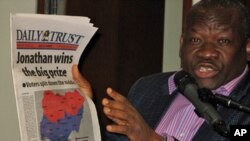Nigeria's ongoing election cycle has gotten mixed reviews from a panel of experts and Nigerian officials in Washington. Concerns were raised about widespread violence and the fairness of the vote counting.
While most experts and officials at the Atlantic Council Washington conference Tuesday said the elections so far were credible, Nasir Ahmad El-Rufai, a former Nigerian government minister, and a supporter of losing presidential candidate Muhammadu Buhari, urged caution.
Official results from the April 16th presidential ballot announced Monday gave incumbent President Goodluck Jonathan a new mandate with 57 percent of the vote.
But El-Rufai alleged there had been tampering of ballots before they reached the Abuja-based Independent National Election Commission, known as INEC.
"I know that many people in Washington and in Brussels would want to celebrate Nigeria's election and say it is a great success," said Nasir Ahmad El-Rufai. "I am sorry I disagree. I think it is a major improvement but unless and until we find a way to get results of elections at polling unit level going directly to the chairman of INEC, without any human intervention, without any ability to change the numbers, we are not going to have credible elections in Nigeria."
One of the dozens of Nigerians in attendance, Juliana Oyegun, a World Bank official, urged El-Rufai to immediately go back to Nigeria and help end the violence and rioting which has taken place in more than a dozen states.
"You cannot speak of a democracy without a presumption that violence is off the table," said Juliana Oyegun. "This is a prerequisite as far as I am concerned. Democracy is not just about voting. It is also about citizenship and mutuality. In the absence of that, how do you build a nation?"
An adviser to President Jonathan, Oronto Douglas, asked for proof of widespread tampering.
"Yes there were flaws, but these were not enough to sour the sweet soup of our democracy, not enough at all," said Oronto Douglas. "It is important that in our examining of this election we should look at the positives. The positives include (that) Nigerians have come together under [Mr.] Jonathan to build a new Nigeria."
Former U.S. Assistant of State for African Affairs Jendayi Frazer urged all grievances to be processed through Nigerian courts, even if these were slow, and not trusted by all political actors.
"The courts overturned many of the ruling party victories from the last elections so I think that the people of Nigeria can have some faith in the judicial system and the fact that it takes a long time for cases to come forward, for evidence to be presented and to be judged on is a problem of all judicial systems of the world," said Jendayi Frazer.
Panelists said the final sequence of balloting on April 26 to determine Nigeria's next governors as well as dozens of remaining parliamentary seats which were not yet contested are now under the threat of opposition boycotts as well as more violence.
Nigeria's Elections Get Mixed Reviews




